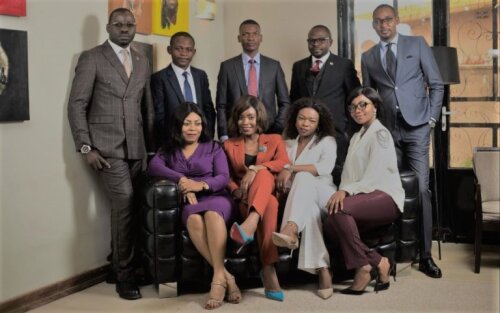Best Water Law Lawyers in Lubumbashi
Share your needs with us, get contacted by law firms.
Free. Takes 2 min.
List of the best lawyers in Lubumbashi, DR Congo
About Water Law in Lubumbashi, DR Congo
Water Law in Lubumbashi, Democratic Republic of the Congo (DR Congo), governs the use, management, and protection of water resources within the city and its surrounding areas. As the second-largest city in the country and a hub for mining and industrial activities, Lubumbashi faces unique water management challenges. Water Law is a specialized legal field that covers issues related to the allocation, quality, conservation, and commercialization of water resources. It also regulates how individuals, companies, and government bodies interact with natural and supplied water, addressing both public and private interests.
Why You May Need a Lawyer
Several scenarios can lead individuals or organizations to seek legal advice regarding Water Law in Lubumbashi. Some of the most frequent situations include:
- Disputes over water usage rights between neighboring properties, industries, or communities
- Allegations of illegal water extraction or pollution by private individuals, mining companies, or factories
- Issues with obtaining necessary permits for boreholes, wells, or new water infrastructure
- Matters concerning water service delivery, billing, or supply interruptions from public utilities
- Concerns about the environmental impact of water usage or contamination
- Compliance with local and national water regulations for businesses and industries
- Compensation claims related to water damages, shortages, or flooding
Local Laws Overview
Water Law in Lubumbashi is primarily shaped by national legislation, such as the Water Code (Code de l’Eau), and is supplemented by provincial regulations and municipal bylaws. Key aspects of local Water Law include:
- Water Ownership and Rights: Water is regarded as a national resource; its management and allocation are primarily the responsibility of the state and provincial authorities.
- Licensing and Permits: Extraction, use, or transfer of significant quantities of water often require permits from relevant authorities, particularly for industrial or agricultural purposes.
- Water Quality and Pollution: Strict regulations seek to prevent the contamination of water bodies. Entities found polluting water resources can face legal consequences, including fines and operational bans.
- Infrastructure Development: Construction of wells, dams, pipelines, or treatment plants requires adherence to both environmental and safety regulations.
- Dispute Resolution: Mechanisms are in place for resolving water-related conflicts, which may involve local water agencies, courts, or customary bodies, depending on the case specifics.
- Service Delivery: The provision and pricing of water services by municipal or private entities are regulated to protect consumer interests and ensure public health.
Frequently Asked Questions
What is considered illegal water use in Lubumbashi?
Illegal water use generally refers to extracting water without the proper permits, diverting waterways, or contaminating water sources. It can apply to individuals, companies, or entities found in violation of the Water Code or local regulations.
Who is responsible for granting water use permits?
In Lubumbashi, water use permits are typically granted by provincial water authorities, in coordination with national agencies such as the Ministry of Environment and Sustainable Development.
Can individuals drill private wells on their property?
Yes, it is possible for property owners to drill private wells, but this often requires obtaining a permit and ensuring compliance with local environmental and safety standards.
What should I do if my water source becomes contaminated?
It is important to report the contamination immediately to local authorities or the public water utility. You may have legal recourse, especially if the contamination results from another party’s actions.
Are there restrictions on using river or lake water for farming?
Yes, the use of surface water for agricultural purposes requires compliance with legal standards and usually a formal authorization. These rules exist to prevent overexploitation and pollution.
Can a neighbor legally divert a stream or drainage channel?
No, diverting natural watercourses without authorization is typically prohibited. Such actions may be subject to legal penalties and can result in compensation claims if damages occur.
Who pays for water infrastructure improvements in my area?
Funding for water infrastructure may come from public agencies, municipalities, or through special contributions from residents and businesses, depending on the specific project and local arrangements.
How are water disputes resolved?
Water disputes may be resolved through negotiations, mediation by local or customary authorities, or, if necessary, through the provincial courts.
What are the penalties for violating Water Law?
Penalties can range from monetary fines to the suspension of water use rights, closure of facilities, and, in severe cases, criminal prosecution.
How can I challenge a water bill or service interruption?
First, address the issue with the service provider. If unresolved, you may file a formal complaint with the water regulatory authority or seek legal assistance to protect your interests.
Additional Resources
If you need more information or support regarding Water Law in Lubumbashi, the following resources may be helpful:
- Ministry of Environment and Sustainable Development: The main government body for environmental and water resource regulation.
- Provincial Water Directorate (Direction Provinciale de l’Eau): Handles water management and permit applications in Lubumbashi and Katanga Province.
- REGIDESO: The national water supply company, managing public water services and billing issues.
- Local Environmental NGOs: Organizations such as ACEDH (Action Contre l’Érosion et pour le Développement Humain) provide advocacy and sometimes legal support for environmental and water issues.
- Bar Association of Lubumbashi: Can help connect you with qualified lawyers experienced in Water Law.
Next Steps
If you require legal advice or representation in a Water Law matter in Lubumbashi, consider the following steps:
- Gather all relevant documents, including permits, correspondence, service contracts, or records of the issue at hand.
- Clarify the nature of your issue - whether it concerns a dispute, administrative process, or compliance matter.
- Contact a qualified lawyer with experience in Water Law and local regulations. The Bar Association of Lubumbashi is a reliable starting point for referrals.
- If your case involves government agencies or public utilities, reach out to them directly to understand any administrative remedies or complaint processes available.
- Stay informed about your legal rights and options at every stage of the process. Legal assistance can often save you time, money, and stress in resolving water-related concerns.
Lawzana helps you find the best lawyers and law firms in Lubumbashi through a curated and pre-screened list of qualified legal professionals. Our platform offers rankings and detailed profiles of attorneys and law firms, allowing you to compare based on practice areas, including Water Law, experience, and client feedback.
Each profile includes a description of the firm's areas of practice, client reviews, team members and partners, year of establishment, spoken languages, office locations, contact information, social media presence, and any published articles or resources. Most firms on our platform speak English and are experienced in both local and international legal matters.
Get a quote from top-rated law firms in Lubumbashi, DR Congo — quickly, securely, and without unnecessary hassle.
Disclaimer:
The information provided on this page is for general informational purposes only and does not constitute legal advice. While we strive to ensure the accuracy and relevance of the content, legal information may change over time, and interpretations of the law can vary. You should always consult with a qualified legal professional for advice specific to your situation.
We disclaim all liability for actions taken or not taken based on the content of this page. If you believe any information is incorrect or outdated, please contact us, and we will review and update it where appropriate.











